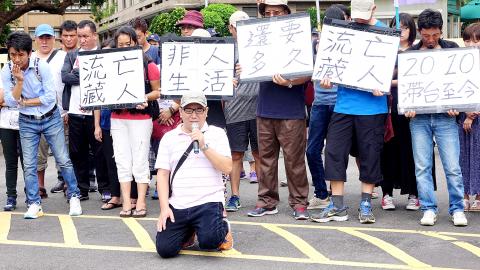Several exiled Tibetans, accompanied by the Taiwan Association for Human Rights and other groups, held a demonstration in front of the Executive Yuan in Taipei yesterday, protesting that they cannot renew their passports, leave the nation, work or join the National Health Insurance system.
Sobbing and kneeling on the ground, the exiled Tibetans said they are worried that they will not even be able to see a doctor if they get sick and they hope the new government can help solve the problem.
“How long do we have to live this inhuman life,” the exiled Tibetans and members of the Taiwan Association for Human Rights, the Union of Excluded Immigrants, the Taiwan Tibetan Welfare Association and other groups chanted.

Photo: Liu Hsin-de, Taipei Times
In September 2014, a group of exiled Tibetans who have been in Taiwan since 2009 began seeking the help of legislators and the Mongolian and Tibetan Affairs Commission to solve the problem that they are unable to renew the passports they used to travel to Taiwan.
According to Article 16 of the Immigration Act (入出國及移民法), the situation of Tibetans who entered Taiwan before the end of 2008 has been solved, but the situation of 17 exiled Tibetans who arrived in Taiwan after that date remains unresolved.
Taiwan Association for Human Rights secretary-general Chiu E-ling (邱伊翎) said the exiled Tibetans have already petitioned the Mongolian and Tibetan Affairs Commission on Oct. 28 last year and the commission had agreed to “restart an investigation” into the individual cases, but the problem still remains.
She said the commission is at fault for inertia, so she is fine with the government abolishing the commission, but she wants to know what the Executive Yuan plans to do to deal with the problem.
Exiled Tibetan Chime Dhondup said his life in Taiwan is very hard because he does not have identification and one time he felt really bad because he went to see a doctor about a stomachache, but did not have a National Health Insurance card.
Dhondup knelt on the ground and asked the government to help him.
Yeshi Dolkar, another exiled Tibetan, said he does not dare go and visit a doctor even when he is sick and he is really worried what would happen if he suffers a serious ailment.

Taiwanese can file complaints with the Tourism Administration to report travel agencies if their activities caused termination of a person’s citizenship, Mainland Affairs Council Minister Chiu Chui-cheng (邱垂正) said yesterday, after a podcaster highlighted a case in which a person’s citizenship was canceled for receiving a single-use Chinese passport to enter Russia. The council is aware of incidents in which people who signed up through Chinese travel agencies for tours of Russia were told they could obtain Russian visas and fast-track border clearance, Chiu told reporters on the sidelines of an event in Taipei. However, the travel agencies actually applied

New measures aimed at making Taiwan more attractive to foreign professionals came into effect this month, the National Development Council said yesterday. Among the changes, international students at Taiwanese universities would be able to work in Taiwan without a work permit in the two years after they graduate, explainer materials provided by the council said. In addition, foreign nationals who graduated from one of the world’s top 200 universities within the past five years can also apply for a two-year open work permit. Previously, those graduates would have needed to apply for a work permit using point-based criteria or have a Taiwanese company

The Shilin District Prosecutors’ Office yesterday indicted two Taiwanese and issued a wanted notice for Pete Liu (劉作虎), founder of Shenzhen-based smartphone manufacturer OnePlus Technology Co (萬普拉斯科技), for allegedly contravening the Act Governing Relations Between the People of the Taiwan Area and the Mainland Area (臺灣地區與大陸地區人民關係條例) by poaching 70 engineers in Taiwan. Liu allegedly traveled to Taiwan at the end of 2014 and met with a Taiwanese man surnamed Lin (林) to discuss establishing a mobile software research and development (R&D) team in Taiwan, prosecutors said. Without approval from the government, Lin, following Liu’s instructions, recruited more than 70 software

Chinese spouse and influencer Guan Guan’s (關關) residency permit has been revoked for repeatedly posting pro-China videos that threaten national security, the National Immigration Agency confirmed today. Guan Guan has said many controversial statements in her videos posted to Douyin (抖音), including “the red flag will soon be painted all over Taiwan” and “Taiwan is an inseparable part of China,” and expressing hope for expedited reunification. The agency last year received multiple reports alleging that Guan Guan had advocated for armed reunification. After verifying the reports, the agency last month issued a notice requiring her to appear and explain her actions. Guan